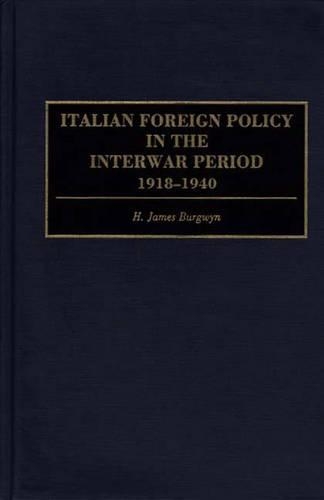
Italian Foreign Policy in the Interwar Period: 1918-1940
(Hardback)
Publishing Details
Italian Foreign Policy in the Interwar Period: 1918-1940
By (Author) H. James Burgwyn
Bloomsbury Publishing PLC
Praeger Publishers Inc
16th April 1997
United States
Classifications
Tertiary Education
Non Fiction
International relations
Warfare and defence
Far-right political ideologies and movements
Central / national / federal government policies
327.45009042
Physical Properties
Hardback
240
Width 156mm, Height 235mm
567g
Description
Italy emerged from the Paris Peace Conference of 1919 with the feeling that it had been denied its just rewards by ungrateful allies and that its victory was thus "mutilated". Integrating this vengefulness into his diplomacy in the 1920s, Mussolini undertook a policy of selected treaty revision aimed at the breakup of the newly-created Yugoslavia by resorting to covert operations. These strategems proved futile. Ignoring the threat posed by Nazi Germany's obvious determination to annex Austria, whose continued independence was key to Italy's security in Europe, Mussolini successfully invaded Ethiopia in October 1935, with only lukewarm opposition from France and Britain. Subsequently, in July 1936, he unwisely intervened on the side of the insurgent general Francesco Franco against the Republican government in Madrid. Instead of the expected speedy victory, Italy got bogged down in a prolonged civil war, which rendered Mussolini even more dependent on Nazi Germany. To preserve his standing in Berlin, he did not lift a finger when the Third Reich marched into Austria in 1938. Convinced in the growing decadence of Western democracies, Mussolini turned to forge the Rome-Berlin Axis. But given Italy's military weakness, Mussolini was bound to be Hitler's junior partner. When the Duce talked of turning the Mediterranean Sea into an Italian lake in February 1939, he found himself trapped in Hitler's military iron cage. Parity in the Axis was the Duce's own peculiar myth. When Germany invaded Poland in September 1939, Mussolini declared nonbelligerency since he was in no position to wage war. He intended to bide his time in order to see who would win or, in the event of a stalemate, to step in as a mediator. But when the Nazi steamroller crushed France, Mussolini felt he had only one option - war on the side of Germany. By tying himself to Hitler's war chariot, Mussolini sacrificed the national interests of his country and doomed his Fascist regime to ultimate destruction.
Reviews
[T]his new work by H.J. Burgwyn is very welcome.-Journal of Modern Italian Studies
Burgwyn's clearly written survey steers a compromise course amid conflicting recent interpretations of Mussolini's foriegn policy.... This book's straightforward prose and chronological arrangement will appeal to students.-Choice
"This new work by H.J. Burgwyn is very welcome."-Journal of Modern Italian Studies
"[T]his new work by H.J. Burgwyn is very welcome."-Journal of Modern Italian Studies
"Burgwyn's clearly written survey steers a compromise course amid conflicting recent interpretations of Mussolini's foriegn policy.... This book's straightforward prose and chronological arrangement will appeal to students."-Choice
Author Bio
H. JAMES BURGWYN is Professor of History at West Chester University. During a two-year leave of absence 1977-1979, he served as an Assistant Director at the Salzburg Seminar in American Studies in Salzburg, Austria. He is the author of Il Revisionismo Fascista and The Legend of the Mutilated Victory: Italy, the Great War, and the Paris Peace Conference (Greenwood, 1993) and has contributed articles in numerous journals both in America and Italy.
